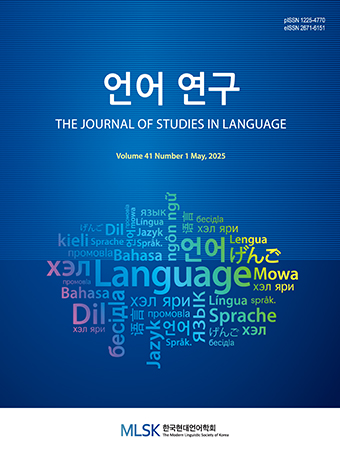Research Article
Abstract
References
Information
The current paper aims to identify the semantico-pragmatic role of the adverb wancen in Korean. Rather than treating wancen as a typical degree modifier, we propose the novel role of wancen as an illocutionary intensifier in this paper. Specifically, we suggest the core properties of wancen as follows: First, unlike the usual degree intensifiers, the illocutionary intensifier wancen targets a scale in the speaker’s epistemic attitude towards the proposition. By using wancen, the illocutionary effect of assertion can be maximally strengthened. Second, wancen gives rise to a pragmatic intensification effect by means of a subjective speaker-oriented adverb as a weak PPI (Ernst, 2009). The theoretical implication of the current study is to provide a widened view of cross-linguistic variation to cases where the intensifier does not necessarily have a lexical degree modifier, and languages parameterize the semantics and pragmatics of their illocutionary intensifier.
- 강은정, 신현정. 2016. 한국어 ‘완전’과 ‘완전히’의 의미통사적 고찰: 일본어와의 대조를 중심으로. 한국어 교육, 23.1, 331-353.
- 박유경. 2020. 장형 부정의문문의 편향적 의미에 대하여. 한국어 의미학, 67, 53-91. 10.19033/sks.2020.3.67.53
- 서경숙. 2008. ‘완전’의 부사화에 대한 연구. 언어와 언어학, 42, 93-112.
- 안혜지. 2015. 신어 정도부사의 형태와 의미 - ‘완전, 대박, 개’를 중심으로. 석사학위논문, 성균관대학교.
- 엽영입, 양명희. 2016. 강조어 ‘완전’의 사용에 대한 고찰 -구어와 통신언어를 중심으로. 한국어 의미학, 52, 251-269.
- 이하얀, 황화상. 2017. ‘완전’의 문법 기능의 확장에 대하여. 한국어학, 74, 147-167. 10.20405/kl.2017.02.74.147
- 이해윤. 2014. Verum Focus로서의 한국어 어말머이 ‘-지’. 언어연구, 30.2, 417-438. 10.18627/jslg.30.2.201408.417
- 홍사만. 2002. 국어 정도 부사의 피한정어 연구. 어문학, 76, 153-174.
- Anand, P. and Hacquard, V. 2008. Epistemics with attitude. Semantics and Linguistic Theory 18, 37-54. 10.3765/salt.v18i0.2484
- Beltrama, A. 2018. Totally between subjectivity and discourse. Exploring the pragmatic side of intensification. Journal of Semantics 35.2, 219-261. 10.1093/semant/ffx021
- Beltrama, A. and Trotzke, A. 2019. Conveying emphasis for intensity: Lexical and syntactic strategies. Ling Linguist Compass 13.7, 1-13. 10.1111/lnc3.12343
- de Vries, H. 2018. Gradable nouns as concepts without prototypes. In E. Castroviejo, L. McNally, & G. W. Sassoon (eds.), The Semantics of Gradability, Vagueness, and Scale Structure. Cham: Springer. 10.1007/978-3-319-77791-7_5
- Ernst, T. 2009. Speaker-oriented adverbs. Natural Language and Linguistic Theory 27, 497-544. 10.1007/s11049-009-9069-1
- Ghomeshi, J., Jackendoff, R., Rosen, N. R. and Russell, K. 2004. Contrastive focus reduplication in English (the salad-salad paper). Natural Language and Linguistic Theory 22.2, 307-357. 10.1023/B:NALA.0000015789.98638.f9
- Giannakidou, A. 1999. Affective dependencies. Linguistics and Philosophy 22, 367-421. 10.1023/A:1005492130684
- Höhle, T. N. 1988. Vorwort und Nachwort zu Verumfokus. Sprache und Pragmatik 5, 1-7.
- Höhle, T. N. 1992. Über Verum-fokus im Deutschen. In: Jacobs, J. (ed.), Informationsstruktur und Grammatik. Opladen: Westdeutscher Verlag (= Sonderheft der Linguistischen Berichte 4), 112-141. 10.1007/978-3-663-12176-3_5
- Kennedy, C. 2007. Vagueness and grammar: The semantics of relative and absolute gradable adjectives. Linguistics and Philosophy 30, 1-45. 10.1007/s10988-006-9008-0
- Kennedy, C. and McNally, L. 2005. Scale structure, degree modification and the semantics of gradable predicates. Language 81, 345-381. 10.1353/lan.2005.0071
- Lee, H. S. 2018. A cognitive comparative analysis on adverbs related with COMPLETENESS. Discourse and Cognition 25.1, 147-169. 10.15718/discog.2018.25.1.147
- McNabb, Y. 2012. The Syntax and Semantics of Degree Modification. Doctoral Dissertation, Chicago: University of Chicago.
- Morzycki, M. 2012. Adjectival extremeness: Degree modification and contextually restricted scales. Natural Language and Linguistic Theory 30, 567-609. 10.1007/s11049-011-9162-0
- Papafragou, A. 2006. Epistemic modality and truth conditions. Lingua 116, 1688-1702. 10.1016/j.lingua.2005.05.009
- Quirk, R., Greenbaum, S., Leech, G., and Svartvik, J. 1985. A Comprehensive Grammar of the English Language, New York: Longman.
- Traugott, E. C. 1982. From propositional to textual and expressive meanings: Some semantic- pragmatic aspects of grammaticalization. In Winfred P. Lehmann and Yakov Malkiel (eds.), Perspectives on Historical Linguistics, 245-271. Amsterdam/Philadelphia: Benjamin. 10.1075/cilt.24.09clo
- Traugott, E. C., 1986. From polysemy to internal semantic reconstruction. In Proceeding of Berkerly Linguistic Society 12, 539-550. 10.3765/bls.v12i0.1853
- Traugott, E. C. 2007. (Inter)subjectification and unidirectionality. Journal of Historical Pragmatics 8.2, 295-309. 10.1075/jhp.8.2.07clo
- Traugott, E. C. 2010. (Inter)subjectivity and (inter)subjectification: a reassessment. In: Davidse, K., Vandelanotte, L., Cuyckens, H. (eds.), Subjectification, Intersubjectification and Grammaticalization. De Gruyter Mouton, Berlin, 29-71. 10.1515/9783110226102.1.29
- von Stechow, A. 1984. Comparing semantic theories of comparison. Journal of Semantics 3, 1-77. 10.1093/jos/3.1-2.1
- Publisher :The Modern Linguistic Society of Korea
- Publisher(Ko) :한국현대언어학회
- Journal Title :The Journal of Studies in Language
- Journal Title(Ko) :언어연구
- Volume : 38
- No :3
- Pages :239-258
- DOI :https://doi.org/10.18627/jslg.38.3.202211.239




 The Journal of Studies in Language
The Journal of Studies in Language






